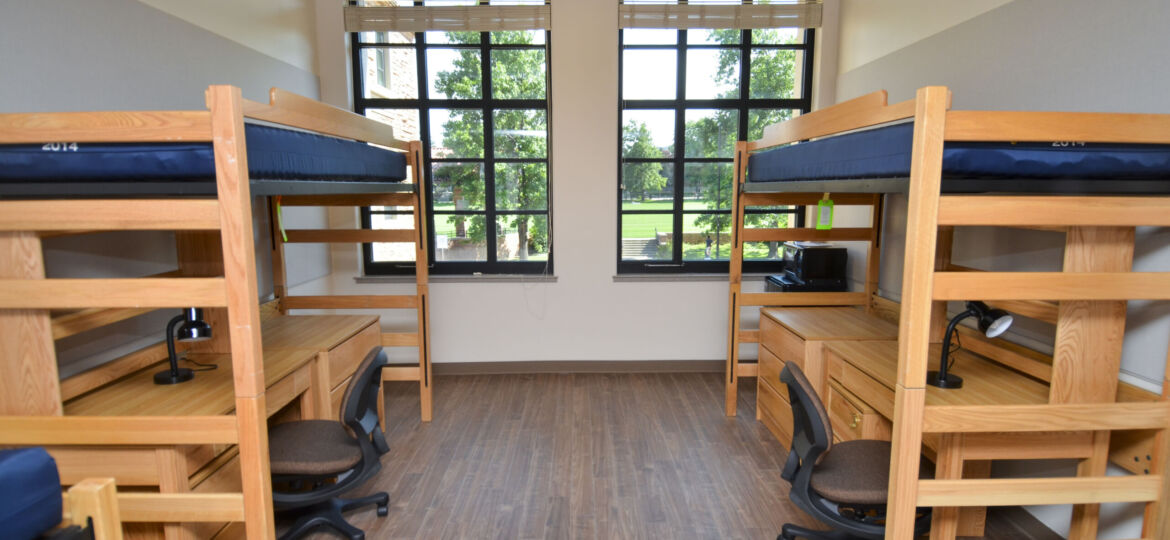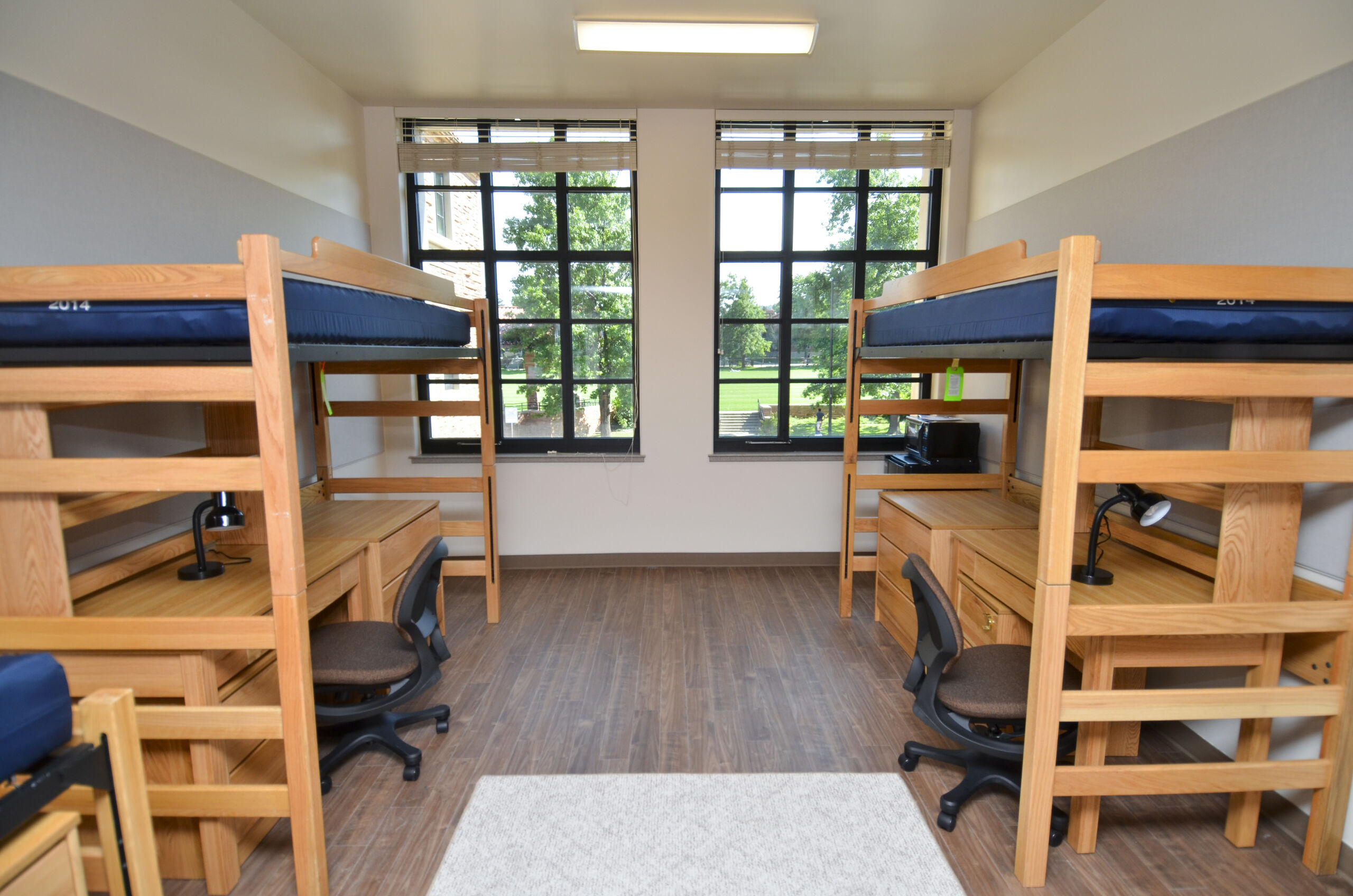
A survival guide to living with a roommate
One of the first college experiences most students have is living with a roommate, which can be a big adjustment. This year, students like you will have to navigate this change while keeping yourself and others safe— something unprecedented with the rise of COVID-19. This feeling of uncertainty can be overwhelming and scary. I, too, was once a very intimidated but excited freshman coming into CU Boulder last fall. With all the changes happening this year, I’ve put together a roommate survival guide that will show you how to communicate with your roommate, stay safe and still have a fun college experience.

The first few weeks of living with a roommate can feel weird and awkward, especially when you weren’t able to select your roommate; but you can still come out with a great roommate experience, just as I did, and grow a lot from it. The key is communication, and your roommate agreement is one way to start the conversation about the expectations for your living arrangement.
The roommate agreement is a form on the Roompact portal that requires both yourself and your roommate to fill out information about your living preferences. It is normal to feel uncomfortable when talking about your boundaries and expectations for living with another person. However, having these conversations is especially important this year.

Due to CU Boulder reducing the number of students living in residence halls, there is limited space on campus and the likelihood of being able to change roommates has decreased. Odds are that you will be with the same roommate as long as you are living in the residence hall, making it even more important to communicate with your roommate from the very beginning.
“So here’s the tricky part, there won’t be space…so I think it’s going to be really important for folks to communicate, right? Cause that’s the biggest issue is unspoken expectations,” said Crystal Lay, the director of residence life at CU Boulder. “…People have to be ridiculously clear about what their expectations are.”

When I had to fill out a roommate agreement form, my roommate and I did not take it seriously at all. We wrote vague things like “be nice,” and “don’t steal each other’s stuff.” However, with the changes COVID-19 has brought, I highly encourage you to take this seriously and voice your concerns now rather than when it becomes a problem in the future.
Lay explained that the questions and topics included in the roommate agreement are based on common roommate issues that can lead to conflict, such as how often visitors can come to the room, sleeping schedules and personal hygiene in relation to COVID-19. This is a great tool for you and your roommate to reflect on if conflicts arise, so be specific.
According to Colin Johnson, a conflict resolution coordinator at CU Boulder, he recommends “using that roommate agreement as a guide to kind of have conversations with one another, and be as transparent and honest with one another as possible.”
Colin Johnson explains why it’s better to be honest rather than tell your roommate what you think they want to hear.
Johnson suggests viewing the roommate agreement as a living document that you can revisit in a month or so when you get more comfortable with your roommate and living situation.
If conflict arises between you and your roommate, it is important to know that conflict is “important and natural,” according to Johnson. Johnson views conflict as similar to a fire: while it can be really harmful if not put out, it is also vital to our survival by helping us cook and keep warm.
Colin Johnson explains the value of conflict.
When addressing conflict, Johnson recommends you discuss the personal impact something has had on you by using “I” statements and describing how you feel, when you feel that way, why you feel that way and what alternatives would work for you.
“I always advise folks— especially when we’re talking about safety, health, you know, boundaries, something like that— providing ‘the why’ is one of the most important things you can do,” said Johnson. “Being able to provide that ‘why’ around anything, and not just around COVID but around any kind of conflict, I think is one of the most important things you can do because you can argue beliefs…you can argue opinions, but it’s really challenging to argue against somebody’s experiences and somebody’s feelings.”

While it is important to address the feelings and experiences you are having, Johnson explained that it’s also critical that you listen and have empathy.
Colin Johnson describes what to listen for when you’re in conflict with someone.
“I think most people don’t want to make other people unhappy or uncomfortable,” said Johnson. “And so if roommates are differing around social distancing, I think that’s where empathy and listening need to come in, so they can have conversations with one another and work together to kind of find some sort of solution that works for both of them.”
If the conflict is severe and no resolution seems possible, you can bring a third party in— a person who is unbiased and someone you can trust, such as an RA, a hall director or a staff member from the conflict resolution office— to help mediate.
The biggest piece of advice that Johnson offered was to “approach conflict with curiosity” and to wonder “not what’s wrong with this person, but what has happened to this person and what has this person been through.”
Remember, conflict is not always a bad thing; even though it may be challenging in the moment, it can also be a beneficial tool that will make you and your roommate grow stronger in the long run.
So let’s talk about living in a dorm and remaining safe during a global pandemic. One of the biggest adjustments that CU Boulder has made is the transition to creating academic cohorts, otherwise called a “First Year Academic Cohort” (FYAE), that exist in most residence halls across campus. These academic cohorts are smaller communities within the residence hall that are often associated with your major. For example, Lay described that English majors would be mostly living with other English majors.
The idea behind academic cohorts relies on living and learning with peers, strengthening your academic and personal relationships. Part of the reason for this change is to help assist in contact tracing for COVID-19 in the case thawhit someone tests positive, with the hope that the number of people the person came into contact with will be limited to mostly people within the same residence hall and not throughout all of campus.
“The nice part is that even though you are in a cohort, you will have the opportunity to socialize with other students, obviously through virtual platforms or digital platforms,” said Lay about the ability of students in different majors to connect with one another. “But the cohorts are designed to help with some tracing pieces to help people build a community.”
With the additional regulations put into place to help prevent the spread of COVID-19, it is important that you also talk with your roommate about what rules or boundaries you want to set for your room. If you or your roommate think that you have symptoms of COVID-19, it is crucial that you keep our community’s safety in mind.
- Symptoms can include a cough, fatigue, fever, vomiting and a loss of taste, among others.
- If symptoms occur, stay in your room and let others know that you are experiencing symptoms.
- You can contact your RA, call CU Boulder’s Medical Services NurseLine at 303-492-5101 or call your own physician to get yourself tested.
Crystal Lay explains what to do if you or your roommate experience symptoms.
In an effort to help monitor residents living in residence halls, the university requires that all staff, faculty and students fill out a daily health form before coming to campus. Students who live in residence halls are also required to get a weekly, saliva-based COVID-19 RT-PCR monitoring test.
“We want folks to think of this as ‘How do I not just protect myself, but other people and the community,’” said Lay. “And so if I am not feeling well, I think I have a responsibility to the people around me to take care of myself.”
Now, more than ever, communication with your community and your roommate is an important step towards having a successful year. Let us all watch out for the Boulder community, while still having a great and safe semester in your residence hall.

